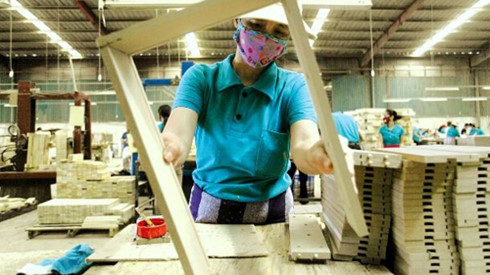FLEGT—A passport to the EU for Vietnamese timber products
Vietnam and the European Union (EU) have agreed in principle on a Forest Law Enforcement, Governance and Trade Voluntary Partnership Agreement (FLEGT VPA).
 |
It is expected to promote sustainable forest management and wood processing in Vietnam, as well as to earn Vietnam a passport for its exports of timber and timber products to the EU market.
This means that the high standards of accountability and traceability demanded by the EU Timber Regulation will no longer be required of Vietnamese timber exports recognised under the FLEGT VPA.
With this outcome in mind, Vietnam and the EU have been negotiating the VPA since October 2010.
Last week in Hanoi, the two sides announced the conclusion of their negotiations on the core terms of the agreement after six years of deliberations including dozens of high-level and technical meetings.
This marks a step forward for the two sides’ cooperation to combat illegal logging, to strengthen forest governance and to promote bilateral trade in legal timber products.
Once the agreement is signed and ratified, it will open the door for Vietnam’s wood processing industry to expand its exports not only to the EU, but to other markets as well, benefiting the economy, the environment and society, as well as enhancing Vietnamese wood brands.
Vietnam’s exports of wood and wood products have gone to more than 90 countries around the world with their total value exceeding US$7.1 billion in 2015 and nearly reaching US$6 billion in the first ten months of this year.
Wood processing now has one of the highest export values of any agroforestry and fisheries sector, contributing to an increase in the nation’s foreign currency collection and its socioeconomic development, while gradually asserting the industry’s position on the international market.
Obtaining such a passport has been no easy task, but retaining it will be still more difficult. There are currently nearly 3,900 wood processing enterprises of all types across the nation, of which 95% are owned by the domestic private sector and foreign investors, with the State owning only 5%.
Regarding the scale of capital investment, more than 93% of timber processing enterprises are considered to operate on a micro or small scale, 5.5% on a medium scale and only 1.2% on a large scale.
Consequently, it is necessary to review and replan the organisation of timber processing facilities in line with export planning so as to ensure the quality of Vietnamese timber exports, especially those from micro- and small-scale enterprises.
Moreover, it is necessary to improve the quality and design of wood products so as to suit both domestic and foreign customers’ tastes, while developing sustainable brand names and issuing certification for exports.
Each region of the country should choose a wood processing village or business as its leader in gathering others to coordinate production and seek markets for their products, in addition to developing products to fit each market segment and promoting trade to stabilise and expand the market.
Finally, to avoid using illegal wood sources and to mitigate risk in the production and consumption of wood products, businesses, producers and craft villages need to say “no” to illegal timber.
They should also consult relevant organisations to actively explore the terms of the VPA and to make the necessary preparations to sign onto it in the near future.

